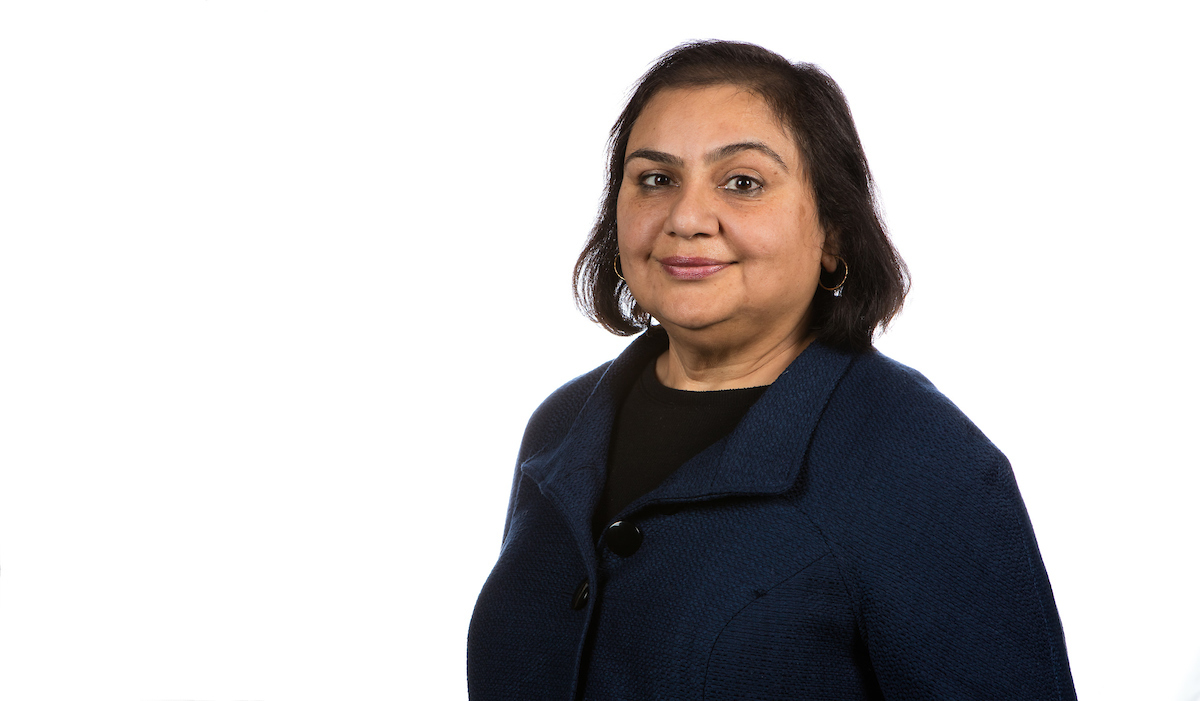 Professor Shailja Sharma created the Refugee and Forced Migration program at DePaul in 2014 to teach students how to work with refugees around the world. She recently received a 2018-19 Fulbright scholarship. (DePaul University/Jeff Carrion)
Professor Shailja Sharma created the Refugee and Forced Migration program at DePaul in 2014 to teach students how to work with refugees around the world. She recently received a 2018-19 Fulbright scholarship. (DePaul University/Jeff Carrion)
After studying in three different countries and earning her Ph.D. from Stony Brook University and earning an additional certificate in refugee studies from Oxford, Shailja Sharma saw a need in the United States for a program on Refugee and Forced Migration studies. Drawing on personal experiences, Sharma, who is a professor in the College of Liberal Arts and Social Sciences, created the Refugee and Forced Migration program at DePaul in 2014 to teach students how to work with refugees around the world. Read on to learn more about the program and her impact at DePaul.
What made you decide this needed to be an academic option at DePaul?
I knew there were programs like this at Oxford, in South Africa, and in Cairo. I didn't see a similar program in the United States. It seemed there was a big gap in terms of study options.
The program is closely linked to DePaul's mission. Any program like this needs to be in an urban area where organizations offer support and employment to students after they graduate. There is something intrinsic to DePaul's mission that supports a program like this.
At that time I was the associate dean of the College of Liberal Arts and Social Sciences, and we were trying to grow graduate programs. We asked faculty interested in this area to come to a meeting; almost 45 people showed up. Most had extensive experience working in the field of refugee and resettlement policy and expressed an interest in teaching the subject. That was really encouraging, and then it took us two years to develop the program.
There is a big discussion around the world about people migrating into established cultures and that they will 'destroy' that culture. Is this a myth? Do academics believe there is any truth to that?
I get that question all the time. "Should we be afraid of refugees?" One discussion in academia involves the various policies around resettlement and immigration. Even though there are 150 countries that signed the
U.N.'s '51 Convention, pledging them to protect refugees, all countries resettle refugees in different ways.
Germany - which took in about 1.1 million Syrian refugees over the past two years - has very established processes through which refugees are settled. They have to take a lot of integration and language classes. Then the state tells them to live for the first five years in areas that need their skills. Organizations help them translate their skills to the current markets, and financial and welfare support from the state is tied to whether or not they fulfilled those courses. There is a lot of emphasis about progressive integration.
The United States is the opposite. Refugees are resettled, and they get three months of welfare assistance. Then they are on their own. If you want refugees to become productive members of society, you must have a process in place to help them. Many come in without the language, and without knowing our culture. If you just throw them in the deep end, they are likely to remain downwardly mobile and not become very successful until the second or third generation. If you help them right off the bat, it's more likely the arriving generation will succeed and integrate.
The U.S. philosophy is to pull yourself up by the bootstraps, I think that's fine for immigrants, especially for skilled immigrants. But refugees spent a lot of time in camps, their skills are not up to date, and they don't know how to navigate in society.
What role do academics play in this issue?
One role is to clarify the legal issues involving refugees. The U.N. offers certain kinds of protection and our country offers a certain type of protection. Academics get the word out about who is a refugee, and what it means to be a refugee versus an asylum seeker and can help ward off potential hysteria from misinformation.
Asylum seekers are people who are already in the country. They came over the border and asked for protection and refugee status. Then there are people overseas seeking refuge. A Department of Homeland Security officer or the U.N. officer determines their case is genuine, and they are resettled in another country as refugees.
Are there any icons stepping up to represent that movement?
That is something that needs to happen more, but many community leaders have emerged.
Suzanne Akhras Sahloul started an organization called the
Syrian Community Network. Her organization is at the forefront of being the first call for Syrian refugees in Chicago.
Lina Sergie Attar started the
Karam Foundation. She works with Syrian refugees in Turkey and in the U.S., especially focusing on education for children who come here and need to get adjusted to American schools.
How can we support refugees, people who have migrated and undocumented people at DePaul?
We should tap into their experience in our classrooms. We should allow them a voice to talk about what it means to be a refugee or an undocumented person. We need to see them as fellow travelers instead of somebody to be pitied. Of course, we should help them, but we should also see them as people who contribute to DePaul.
We have the advantage of having the first program in this field in the U.S. We should highlight it as a program that reflects DePaul's mission and values.